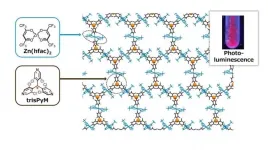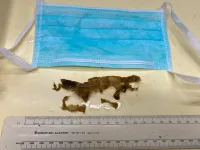"Clofazimine is an ideal candidate for a COVID-19 treatment. It is safe, affordable, easy to make, taken as a pill and can be made globally available," says co-senior author Sumit Chanda, Ph.D., professor and director of the Immunity and Pathogenesis Program at Sanford Burnham Prebys. "We hope to test clofazimine in a Phase 2 clinical trial as soon as possible for people who test positive for COVID-19 but are not hospitalized. Since there is currently no outpatient treatment available for these individuals, clofazimine may help reduce the impact of the disease, which is particularly important now as we see new variants of the virus emerge and against which the current vaccines appear less efficacious."
Promising candidate revealed by screening drug library
Clofazimine was initially identified by screening one of the world's largest collections of known drugs for their ability to block the replication of SARS-CoV-2. Chanda's team previously reported in Nature that clofazimine was one of 21 drugs effective in vitro, or in a lab dish, at concentrations that could most likely be safely achieved in patients.
In this study, the researchers tested clofazimine in hamsters--an animal model for COVID-19--that were infected with SARS-CoV-2. The scientists found that clofazimine lowered the amount of virus in the lungs, including when given to healthy animals prior to infection (prophylactically). The drug also reduced lung damage and prevented "cytokine storm," an overwhelming inflammatory response to SARS-CoV-2 that can be deadly. "The animals that received clofazimine had less lung damage and lower viral load, especially when receiving the drug before infection," says co-senior author Ren Sun, Ph.D., professor at the University of Hong Kong and distinguished professor emeritus at the University of California, Los Angeles (UCLA). "Besides inhibiting the virus, there are indications that the drug also regulates the host response to the virus, which provides better control of the infection and inflammation."
Clofazimine also worked synergistically with remdesivir, the current standard-of-care treatment for people who are hospitalized due to COVID-19, when given to hamsters infected with SARS-CoV-2. These findings suggest a potential opportunity to stretch the availability of remdesivir, which is costly and in limited supply.
How clofazimine works
The study showed that clofazimine stops SARS-CoV-2 infection in two ways: blocking its entry into cells and disrupting RNA replication (SARS-CoV-2 uses RNA to replicate). Clofazimine was able to reduce the replication of MERS-CoV, the coronavirus that causes Middle East Respiratory Syndrome (MERS), in human lung tissue.
"Potentially most importantly, clofazimine appears to have pan-coronavirus activity, indicating it could be an important weapon against future pandemics," says co-senior author Kwok-Yung Yuen, M.D., chair of Infectious Diseases at the University of Hong Kong, who discovered the coronavirus that causes severe acute respiratory syndrome (SARS). "Our study suggests that we should consider creating a stockpile of ready-made clofazimine that could be deployed immediately if another novel coronavirus emerges."
ADD VIDEO: https://www.youtube.com/watch?v=BEkgvviqaf4&t=136s In July 2020 Sumit Chanda shared more about his team's race to find a treatment for COVID-19.
Testing clofazimine in the clinic
A Phase 2 trial evaluating clofazimine in combination with interferon beta-1b as a treatment for people with COVID-19 who are hospitalized is ongoing at the University of Hong Kong. Interferon beta-1b is an immunoregulator that is given as an injection and is currently used to treat people with multiple sclerosis.
"Our data suggests that clofazimine should also be tested as a monotherapy for people with COVID-19, which would lower many barriers to treatment," says Chanda. "People with COVID-19 would be able to simply receive a regime of low-cost pills, instead of traveling to a hospital to receive an injection."
INFORMATION:
Old drug finds new purpose
Clofazimine was discovered in 1954 and is used to treat leprosy. Its promise for treating COVID-19 was discovered by high-throughput screening of more than 12,000 drugs from the ReFRAME drug library--one of the most comprehensive collections of compounds that have been approved by the FDA for other diseases or that have been tested extensively for human safety. ReFRAME was created by Calibr, the drug discovery division of Scripps Research, with support from the Bill & Melinda Gates Foundation, with a goal of repurposing existing drugs to meet unmet clinical needs.
A global effort
The co-senior and co-corresponding study authors are Sumit Chanda of Sanford Burnham Prebys; Ren Sun of the University of Hong Kong and the University of California Los Angeles; and Kwok-Yung Yuen of the University of Hong Kong. The first authors of the study are Shuofeng Yuan, Xiangzhi Meng, Jasper Fuk-Woo Chan and Zi-Wei Ye of the University of Hong Kong; and Xin Yin of Sanford Burnham Prebys, who contributed equally to the study.
Additional study authors include Laura Riva, Lars Pache, Naoko Matsunaga and Yuan Pu of Sanford Burnham Prebys; Chris Chun-Yiu Chan, Pok-Man Lai, Chris Chung-Sing Chan, Vincent Kwok-Man Poon, Andrew Chak-Yiu Lee, Chun-Kit Yuen, Jianli Cao, Ronghui Liang, Kaiming Tang, Wan Xu, Chit-Ying Lau, Ko-Yung Sit, Wing-Kuk Au, Runming Wang, Kong-Hung Sze, Anna Jinxia Zhang, Hin Chu, Kin-Hang Kok, Ivan Fan-Ngai Hung, Ronald Adolphus Li, Honglin Chen, Hongzhe Sun and Dong-Yan Jin of the University of Hong Kong; Yu-Yuan Zhang, Yan-Dong Tang and Xue-Hui Cai of the Chinese Academy of Agricultural Sciences; Thomas Mandel Clausen and Jessica Pihl of the University of California San Diego (UCSD) and University of Copenhagen; Juntaek Oh, Dong Wang and Jeffrey D. Esko of UCSD; Li Sheng of University of Hong Kong and University of California Los Angeles; and Yushen Du of UCLA.
The study's DOI is 10.1038/s41586-021-03431-4.
Research reported in this press release was supported by the National Institutes of Health (NIH) (U19AI118610, U19AI135972, U19AI142733), the Department of Defense (DoD) (W81XWH-20-1-0270), Defense Advanced Research Projects Agency (HR0011-19-2-0020), the Center of Excellence for Influenza Research and Surveillance (HHSN272201400008C), JPB Foundation, the Open Philanthropy Project (2020-215611 (5384)), the University of Hong Kong, National Key R&D Programmes of China (2020YFA0707500, 2020YFA0707504), Richard Yu and Carol Yu, the Shaw Foundation Hong Kong, Michael Seak-Kan Tong, May Tam Mak Mei Yin, Hui Ming, Hui Hoy and Chow Sin, Lan Charity Fund Limited, Chan Yin Chuen Memorial Charitable Foundation, Marina Man-Wai Lee, the Hong Kong Hainan Commercial Association South China Microbiology Research Fund, the Jessie & George Ho Charitable Foundation, Perfect Shape Medical Limited, Kai Chong Tong, Foo Oi Foundation Limited, Tse Kam Ming, Laurence, the Norman & Cecilia Yip Foundation, Dinah Ruch and Susan & James Blair.
About the University of Hong Kong
The University of Hong Kong (HKU), founded in 1911, is the oldest tertiary institution in Hong Kong. HKU delivers impact through internationalisation, innovation and interdisciplinarity. It attracts and nurtures global scholars through excellence in research, teaching and learning, and knowledge exchange.
About Sanford Burnham Prebys Medical Discovery Institute
Sanford Burnham Prebys is a preeminent, independent biomedical research institute dedicated to understanding human biology and disease and advancing scientific discoveries to profoundly impact human health. For more than 40 years, our research has produced breakthroughs in cancer, neuroscience, immunology and children's diseases, and is anchored by our NCI-designated Cancer Center and advanced drug discovery capabilities. For more information, visit us at SBPdiscovery.org or on Facebook at facebook.com/SBPdiscovery and on Twitter @SBPdiscovery.



